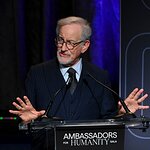Middle and high school students have the chance to win scholarships of up to $5,000 – and additional money for their educators and schools – by entering the third annual IWitness Video Challenge hosted by USC Shoah Foundation - The Institute for Visual History and Education.
Kicking off this week, the challenge, which will award $10,000 in prizes overall, invites students to positively contribute to their communities, and submit short videos explaining the inspiration behind their actions and extraordinary impact. The IWitness Video Challenge is open to all secondary school students in the United States and Canada (except for Quebec) who attend public, private or home schools. Participants can access resources and submit entries at iwitness.usc.edu.
Helping to make this year’s challenge the most successful yet are two organizational partners – Ford Motor Co., which is sponsoring the event as part of its commitment to innovative educational outreach; and Discovery Education, the leading provider of digital content and professional development for K-12 classrooms, which will administer the challenge and help maximize reach and impact through its deep partnerships with school systems, administrators and educators worldwide and unparalleled experience in implementing education-based programs that improve student engagement and achievement.
The contest is based on one of 39 activities found in IWitness, USC Shoah Foundation’s free educational website, which brings the human stories from the Institute’s Visual History Archive – the world’s largest repository of testimony from survivors and witnesses to the Holocaust and other genocides – to teachers and their students via engaging multimedia-learning activities.
The IWitness Video Challenge first presents students with selected testimonies from survivors who demonstrate what is possible when we make the courageous choice to act. Then, the challenge takes students through the steps necessary to identify a problem, determine how to contribute to solving that problem, and how to create a video that captures their efforts and impact on helping to solve a problem in their community. Students will then be instructed on how to use the built-in video editor in IWitness to construct, edit and submit their one- to four-minute video project. No prior video editing knowledge is needed to participate.
The prizes will be distributed as follows:
• The student who created the National Winning Entry will receive a US$5,000 scholarship. Second place will receive a $1,000 scholarship; third place, a $500 scholarship.
• The educator associated with the National Winning Entry will receive a $1,000 grant awarded in the form of a check, to be used to implement change in his/her school.
• The school or organization that hosted the IWitness group/class associated with the National Winning Entry will receive a $2,500 grant awarded in the form of a check, to be used to implement change in their community.
• The winning student, along with an educator and parent/guardian, will be flown to Los Angeles to screen their film at USC Shoah Foundation.
“Not only does the IWitness Video Challenge enable students to link their voices to those in the Visual History Archive who inspired them to act, but it also teaches them digital skills that are so important for students today,” said USC Shoah Foundation Executive Director Stephen D. Smith.
The 2015 winners, Emma Heintz and Natalie Podstawka from East Douglas, Mass., sought to counter hate and negativity throughout their school by writing 415 personalized notes to other students with compliments and encouragement. The eighth-graders were inspired by a short clip of testimony from Holocaust survivor Dina Gottliebova-Babbitt, in which she describes how nervous she was to go out in public wearing the yellow Star of David for the first time. But the first man she came across was also wearing a star, and he smiled at her, which made her feel like she wasn’t quite so alone.
Ruth Hernandez won the inaugural "IWitness Video Challenge in 2014 with her video “Voices of Our Journey,” based on the topic of immigration. She was moved by testimonies of Holocaust survivors who were forced to leave their homes, flee to safety on the Kindertransport or relocate to ghettos. She was particularly struck by the testimony of Leo Fettman, who after deportation lost nearly every member of his immediate family at Auschwitz; he later went on to become a rabbi.
Hernandez participated in a protest for immigration reform held by the New Sanctuary Movement of Philadelphia, which helps undocumented immigrants and works to end injustice against immigrants in the United States. She and some friends made posters, and Hernandez announced the event in her church.
USC Shoah Foundation founder Steven Spielberg launched the inaugural IWitness Video Challenge in 2013. The challenge was designed around the same premise as Schindler’s List, that one person can make a difference. As Spielberg said at the time of the inaugural launch, “We can use IWitness to show the power of random acts of kindness, the significance of contributing to communities and the very idea that the best way to teach empathy is with examples of it so that maybe someday kindness will be a natural reflex.”
“The effectiveness of IWitness is well documented,” said Dr. Kori Street, director of education for USC Shoah Foundation. “Research shows that students’ interest in helping others increased by up to 28 percent after they engaged with the platform. IWitness participants in a recent study also demonstrated a 30 percent improvement in their critical thinking skills.”
Educators interested in signing up their students for the IWitness Video Challenge must submit entries by May 13 at iwitness.usc.edu. Five regional winners will be announced in June. The winners will be announced before the end of the 2015-16 school year.
For more information and complete rules, visit iwitness.usc.edu.



